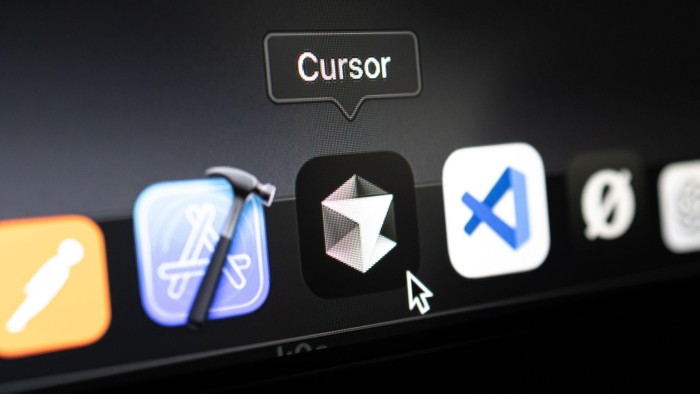Unlock the Editor’s Digest for free
Roula Khalaf, Editor of the FT, selects her favourite stories in this weekly newsletter.
Anysphere, creator of the fast-growing programming tool Cursor, has closed a new round of funding that more than triples its valuation to about $9bn, as money continues to pour into Silicon Valley’s hottest artificial intelligence start-ups.
OpenAI backer Thrive Capital led a $900mn round for San Francisco-based Anysphere, according to people familiar with the deal. Andreessen Horowitz and Accel are among the other investors who participated.
Anysphere was founded in 2022 by a quartet of twenty-somethings who met studying maths and computer science at the Massachusetts Institute of Technology. It was previously valued at $2.5bn in January when it raised $105mn, also from Thrive and Andreessen Horowitz.
The huge jump in Anysphere’s price tag comes after annual recurring revenues grew quickly since its last funding round, rising to about $200mn in April to make it one of the fastest-growing software companies ever.
Nonetheless, the dramatic step up in valuation is likely to reignite concerns among some investors about the sustainability of AI company valuations, particularly given recent turmoil in public markets.
OpenAI was valued at $260bn in March, after SoftBank committed to lead a $40bn investment round into the company.
Two groups founded by former executives at OpenAI — Ilya Sutskever’s Safe Superintelligence and Mira Murati’s Thinking Machines Lab — have also targeted large fundraising rounds.
SSI recently secured a $30bn valuation while Murati’s company was in talks to raise $2bn at a $10bn valuation, according to people familiar with the matter. Neither has yet released a product.
Cursor has won millions of fans among computer programmers for its AI-powered software development toolkit, which its creators say writes almost 1bn lines of working code every day.
By using natural language to tell the AI what to make instead of writing code by hand and “autocompleting” updates, it accelerates productivity for programmers, one of the most in-demand skills in the tech industry.
Despite competing with tools such as Microsoft’s GitHub Copilot, Cursor has customers at tech companies including Stripe, OpenAI and Spotify, according to its website, as well as prominent AI researchers such as Andrej Karpathy.
The former Tesla and OpenAI engineer coined the phrase “vibe coding” in February to describe an almost trance-like state of talking to Cursor’s AI to create software “where you fully give in to the vibes, embrace exponentials, and forget that the code even exists”.
Coding assistants have become a breakout hit among generative AI start-ups, driving huge productivity gains for tech companies.
Last month, Google chief executive Sundar Pichai said that “well over 30 per cent” of code submitted on its internal software development “involves people accepting AI-suggested solutions”.
Several AI coding start-ups have emerged since OpenAI launched ChatGPT in late 2022, including France’s Poolside and Silicon Valley-based Windsurf and Replit.
As the price tags for foundation model companies such as OpenAI and Anthropic have put them out of reach for all but the richest investors, venture capitalists have increasingly looked to AI application developers such as Anysphere, search app Perplexity and video generator Synthesia as a way into the AI boom.
AI app start-ups raised $8.2bn in 2024, more than twice as much as the previous year, according to data from Dealroom.co and Flashpoint.
Many enterprise AI apps have quickly generated tens of millions of dollars in revenue but some investors are concerned that this reflects widespread AI experimentation among companies, rather than durable recurring sales.
Anysphere, Thrive Capital, Andreessen Horowitz and Accel all declined to comment.
